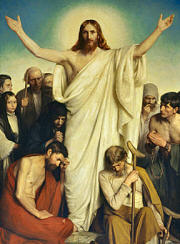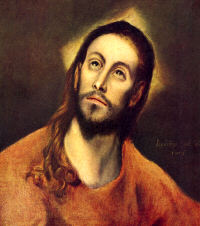Easter: May 23rd
Seventh Sunday of Easter (or Solemnity of the Ascension in some U.S. Dioceses)
» Enjoy our Liturgical Seasons series of e-books!
"Very soon now, I shall be with you again, bringing the reward to be given to every man according to what he deserves. I am the Alpha and the Omega, the First and the Last, the Beginning and the End. Happy are those who will have washed their robes clean, so that they will have the right to feed on the tree of life and can come through the gates into the city" (Rev. 22:12-15).
St. Teresa of Avila says, "May His Majesty be pleased to grant us to experience this before he takes us from this life, for it will be a great thing at the hour of death to realize that we shall be judged by One whom we have loved above all things. Once our debts have been paid we shall be able to walk in safety. We shall not be going into a foreign land, but into our own country, for it belongs to him whom we have loved so truly and who himself loves us" (Way of Perfection, 40).
Note that in many dioceses of the United States, the feast of the Ascension is celebrated on this Sunday. Read the text for Thursday for meditations on the liturgy of the day.
Sunday Readings
The first reading is taken from the Acts of the Apostles 7:55-60 in which we hear of the stoning of Stephen, the first Christian martyr. St. Stephen is stoned because he points out how the Jews have always persecuted the prophets and have even betrayed and murdered the One sent to fulfill all those prophesies.
The second reading is from the Book of Revelation 22:12-14, 16-17, 20 and comes from the closing verses of this book. In a formal, solemn manner Jesus Christ addresses believers and confirms the genuineness of the prophetic content of the book.
 The Gospel is from John 17:20-26 in which Christ prays to the Father for unity among His followers. Union of Christians with Christ begets unity among themselves. This unity of the Church ultimately redounds to the benefit of all mankind, because since the Church is one and unique, she is seen as a sign raised up for the nations to see, inviting all to believe in Jesus Christ as sent by God come to save all men. The Church carries on this mission of salvation through its union with Christ, calling all mankind to join the Church and by so doing to share in union with Christ and the Father.
The Gospel is from John 17:20-26 in which Christ prays to the Father for unity among His followers. Union of Christians with Christ begets unity among themselves. This unity of the Church ultimately redounds to the benefit of all mankind, because since the Church is one and unique, she is seen as a sign raised up for the nations to see, inviting all to believe in Jesus Christ as sent by God come to save all men. The Church carries on this mission of salvation through its union with Christ, calling all mankind to join the Church and by so doing to share in union with Christ and the Father.
The Second Vatican Council, speaking of the principles of ecumenism, links the Church's unity with her universality: "Almost everyone, though in different ways, longs for the one visible Church of God, a Church truly universal and sent forth to the whole world that the world may be converted to the Gospel and so be saved, to the glory of God" (Unitatis redintegratio, 1). This universality is another characteristic of the Church, technically described as "catholicity". "For many centuries now the Church has been spread throughout the world; and it numbers persons of all races and walks of life. But the universality of the Church does not depend on its geographical distribution, even though this is a visible sign and a motive of credibility. The Church was catholic already at Pentecost: it was born catholic from the wounded heart of Jesus, as a fire which the Holy Spirit enkindled.
"In the second century the Christians called the Church catholic in order to distinguish it from sects which, using the name of Christ, were betraying his doctrine in one way or another. 'We call it catholic', writes St Cyril, 'not only because it is spread throughout the world, from one extreme to the other, but because in a universal way and without defect it teaches all the dogmas which men ought to know, of both the visible and the invisible, the celestial and the earthly. Likewise because it draws to true worship all types of men, governors and citizens, the learned and the ignorant. And finally, because it cures and heals all kinds of sins, whether of the soul or of the body, possessing in addition — by whatever name it may be called — all the forms of virtue, in deeds and in words and in every kind of spiritual life' (Catechesis, 18, 23)" (J. Escriva, Homily on "Loyalty to the Church").
Every Christian should have the same desire for this unity as Jesus Christ expresses in his prayer to the Father. "A privileged instrument for participation in pursuit of the unity of all Christians is prayer. Jesus Christ himself left us his extreme desire for unity through prayer to the Father: '`that they may all be one; even as thou, Father, art in me, and I in thee, that they also may be in us, so that the world may believe that thou hast sent me' (Jn 17:21). — The Navarre Bible - St. John







